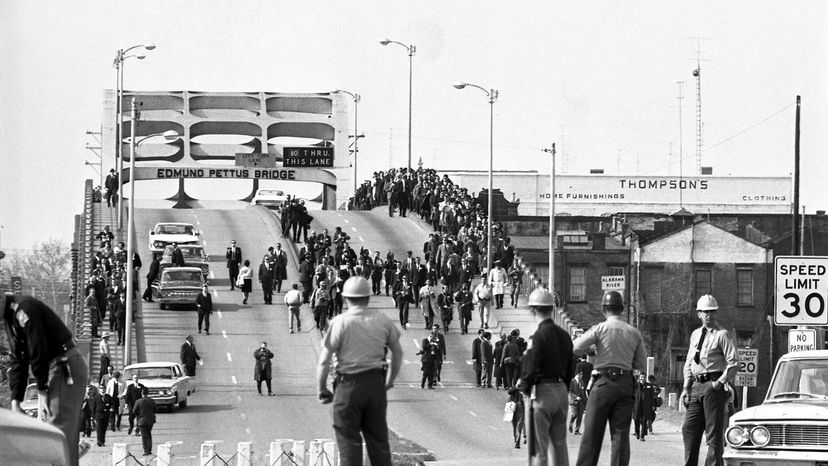Advertisem*nt
By: Alia Hoyt
1 min

Image: Bettmann/Getty Images
About This Quiz
Progress toward freedom and equality for all hasn't been easy. How much do you know about the people and events made famous by the civil rights movement?
What was Dr. King's original first name?
Martin
Michael
Believe it or not, Martin Luther King Jr.'s name was changed at age 5. His father was blown away by the legacy of Protestant Reformation leader Martin Luther while on a trip to Germany. When King returned, he changed his name and his son's to reflect it.
Matthew
How many times was MLK arrested?
12
23
29
The civil rights icon was unceremoniously thrown in jail nearly 30 times. Famously, one of those times was for driving 30 miles per hour in a 25 mph zone (48 kph in a 40 kph zone), while in Montgomery, Alabama.
Which of the following practices was standard under Jim Crow laws and etiquette?
A black male could not offer to light a white woman's cigarette.
White motorists always had the right of way at intersections.
Blacks and whites could not eat together.
all of the above
Known as a racial caste system, the Jim Crow era saw a vast collection of rigid laws, etiquette and practices that treated Black people as inferior, second-class citizens.
Advertisem*nt
Advertisem*nt
Why was Malcolm X assassinated?
because of his criticism of MLK's "I Have a Dream" speech, which he called the "Farce on Washington"
because of his bitter split with the Nation of Islam
Although Malcolm brought the Nation of Islam (NOI) extreme popularity, he fell out with its leader, Elijah Muhammad when he found out the latter had several illegitimate children, in direct violation of the religion's teachings, and began to criticize him publicly. Malcolm was killed by NOI members in 1965.
because of his opinions about integration
Which famous civil rights court case is known for the phrase "separate but equal"?
Dred Scott v. Sanford
Plessy v. Ferguson
In Plessy v. Ferguson, the Supreme Court said that racial segregation laws didn't violate the U.S. Constitution provided the facilities for each race were of equal quality. Thankfully, this ruling was overturned some 55 years later by Brown v. Board of Education. The Brown ruling said that segregation on the basis of race is unconstitutional and "inherently unequal."
Brown v. Board of Education of Topeka
Who said, “You must never be fearful about what you are doing when it is right?”
Rosa Parks
The activist was called the "mother of the civil rights movement" when her refusal to give her bus seat up to a white man in 1955 started a boycott of the Montgomery bus system in Alabama that lasted 381 days, until the Supreme Court ruled segregated seating was unconstitutional.
Harriet Tubman
Maya Angelou
Advertisem*nt
Advertisem*nt
What was the subject of the march in Selma, Alabama, that resulted in Bloody Sunday?
segregation
police brutality
voter rights
John Lewis, who later became a popular congressman, was one of the leaders of the march to bring awareness to the lack of voting rights for African Americans. The march took them across the Edmund Pettus Bridge, where police officers beat them severely, sending 58 people to the hospital, including Lewis.
What prevented many Black people from voting, which Septima Clark fought to correct?
lack of identification
literacy tests
Literacy tests often kept Black people from exercising their right to vote. Many African Americans were illiterate thanks to Jim Crow segregation and the tests were often deliberately confusing. Clark, a former teacher who was fired because of her NAACP affiliation, designed a curriculum to teach reading and writing. (Literacy tests were banned by the Voting Rights Act of 1965.)
lack of transportation
How many missions did the Tuskegee Airmen complete during World War II?
500
4,000
15,000
The group set the gold standard as the U.S. Army Air Corps' first Black aviators. Between them, they earned 150 Distinguished Flying Crosses for their heroic missions and inspired integration within the armed forces.
Advertisem*nt
Advertisem*nt
When did the civil rights movement start?
1954
The 1954 Supreme Court decision on Brown v. Board of Education (which outlawed segregation) is often considered to be the beginning of the modern civil rights movement, which lasted through the 1960s. However, African Americans had been agitating for their civil rights long before this period and in some ways, the fight still continues.
1948
1960
Bettmann/Getty Images
Advertisem*nt
Advertisem*nt
